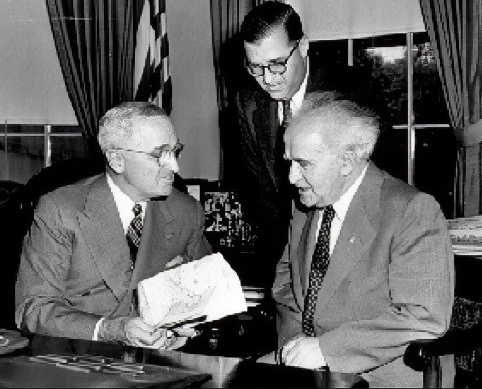
(function(d, s, id) { var js, fjs = d.getElementsByTagName(s)[0]; if (d.getElementById(id)) return; js = d.createElement(s); js.id = id; js.src = “https://connect.facebook.net/en_US/sdk.js#xfbml=1&version=v3.0”; fjs.parentNode.insertBefore(js, fjs); }(document, ‘script’, ‘facebook-jssdk’)); –>
–>
February 10, 2024
Researching America’s role in the founding of the modern Jewish state led me to a fascinating historical nugget that rejiggers much of what we know about modern Israel’s founding. The truth is not what you may think it is. It shows that the state was very early on a pawn in the Cold War and that Truman was callously willing to jettison the Jews if need be.
‘); googletag.cmd.push(function () { googletag.display(‘div-gpt-ad-1609268089992-0’); }); document.write(”); googletag.cmd.push(function() { googletag.pubads().addEventListener(‘slotRenderEnded’, function(event) { if (event.slot.getSlotElementId() == “div-hre-Americanthinker—New-3028”) { googletag.display(“div-hre-Americanthinker—New-3028”); } }); }); }
In a 1998 essay marking Israel’s 50th anniversary, historian Paul Johnson addressed a “paradoxical aspect of the Zionist miracle, which we certainly did not grasp at the time and which is insufficiently understood even now.” Martin Kramer explained in an illuminating essay from November 2017.
On November 29, 1946, the United States voted for the resolution to partition British Palestine into two separate sectors, one Jewish and one Arab. At the same time, though, it imposed an arms embargo to stop any arms from going to the Jews in British Mandate Palestine. This left 650,000 Jews alone and without weapons to defend themselves and face 50 million Arabs pledging to finish what Hitler started.
No Truman defenders can deny this reality. We can only conclude the president was prepared to accept another Jewish genocide. He knew that the Grand Mufti of Jerusalem, Haj Amin al Husseini, had raised an Islamic army for the Nazis in return for a German promise to this end. After the war, he was a wanted war criminal. There are still surviving pictures of him with his good friend Adolf Hitler. He was the spiritual father of the Gaza and West Bank Arabs and terrorist Yasser Arafat’s uncle.

Image: Harry Truman meeting with Ben Gurion and Abba Eban. Public domain.
‘); googletag.cmd.push(function () { googletag.display(‘div-gpt-ad-1609270365559-0’); }); document.write(”); googletag.cmd.push(function() { googletag.pubads().addEventListener(‘slotRenderEnded’, function(event) { if (event.slot.getSlotElementId() == “div-hre-Americanthinker—New-3035”) { googletag.display(“div-hre-Americanthinker—New-3035”); } }); }); }
The Arabs, meanwhile, easily obtained arms. Jordan’s Arab Legion was armed and trained by the British and led by a British officer. At the end of 1948 and in the beginning of 1949, British RAF aircraft flew with Egyptian squadrons over the Egyptian-Israel border. On January 7, 1949, Israeli planes shot down four British aircraft.
That wasn’t the only strange thing that the United States did. After first approving a two-state solution, by March of 1948, the United States reversed itself on the two-state solution and, instead, sought a temporary United Nations (UN) trusteeship. On the eve of the British withdrawal from Israel in May 1948, America’s top diplomat warned Israeli leaders against declaring independence.
What was all this sea-sawing from the United States? The answer lies in the Cold War.
Harry Truman faced a difficult presidential election in 1948 and needed every vote and campaign contribution he could muster, including from America’s Jews. This was the driving force behind his support for establishing the state of Israel. However, the Cold War ultimately drove his policies, and he was indifferent about the fate of the Jews. Once out of office, though, Truman would unabashedly take full credit for Israel’s creation simply because, in May 1948, he recognized Israel as a fait accompli (de facto) but not de jure, as a legal entity.
By contrast, the Soviet Union under Stalin also voted for partition and recognized the new State of Israel de jure as opposed to the limited de facto recognition from Truman. It held firm in its commitment before and after the vote for partition.
In a May 1947 United Nations speech, Soviet Ambassador to the U.N., Andrei Gromyko, astonished the assembly with a humanist speech about Israel. Kramer writes (emphasis mine):
‘); googletag.cmd.push(function () { googletag.display(‘div-gpt-ad-1609268078422-0’); }); document.write(”); googletag.cmd.push(function() { googletag.pubads().addEventListener(‘slotRenderEnded’, function(event) { if (event.slot.getSlotElementId() == “div-hre-Americanthinker—New-3027”) { googletag.display(“div-hre-Americanthinker—New-3027”); } }); }); } if (publir_show_ads) { document.write(“
During the war [said Gromyko], the Jewish people had been subjected to “indescribable sorrow and suffering. It is difficult to express them in dry statistics.” Jews had been subjected to “almost complete physical annihilation.” And now “hundreds of thousands of Jews are wandering about in various countries of Europe,” many in camps for displaced persons where they are “still continuing to undergo great privations…. The time has come, “to help these people, not by word, but by deed…. This is a duty of the United Nations.”
[snip]
“No Western European state,” Gromyko asserted,
has been able to assure the defense of the elemental rights of the Jewish people. This is an unpleasant fact, but unfortunately like all other facts, it must be admitted, and that explains the aspirations of the Jews to establish their own state.
And then the bombshell:
It would be unjust not to take this into consideration and to deny the right of the Jewish people to realize this aspiration. It would be unjustifiable to deny this right to the Jewish people, particularly in view of all it has undergone during the war.
In March 1948, with the United States retreating from the idea of partition, the Soviet Union stood in favor of it and attacked Truman’s trusteeship proposal. If trusteeship were put to a vote, Gromyko warned that the Soviet Union would cast a no vote. The Soviet Union also authorized its satellite, Czechslovakia, to sell desperately needed arms to Israel.
According to Abba Eban, Israel’s first U.N. Ambassador, without the Soviet bloc, “we couldn’t have made it diplomatically or militarily.” Likewise, David Ben-Gurion, Israel’s first prime minister, said, “They (Soviet Union) saved the country, I have no doubt of that.” In her memoirs, Golda Meir similarly wrote that without the arms from the Eastern Bloc, “I do not know whether we actually could have held out until the tide changed as it did by June 1948.” From partition until June, as Meir said, things were grim.
This wasn’t philosemitism, of course. It was because Israel was then a socialist experiment and had instantly become a Cold War pawn, with the Soviet Union backing it and Truman jettisoning his support lest the Soviets get a win. Indeed, across Washington, D.C., Israel was no longer America’s concern.
Of course, there was a bit more going on than pure Cold War politics. The Secretary of State in particular, former General George C. Marshall among them, was unconcerned with the fate of the Jewish people. Why else the embargo? Marshall, like the British, preferred a relationship with Arab oil over the existence of the Jewish State. He was firmly against partition and the establishment of a Jewish state.
Also, credit for Russian support must be given to the diplomatic efforts led by Chaim Weizmann, who was Israel’s first president, and Ben-Gurion, as well as the “vagaries of fate,” sometimes referred to as the G-d of Abraham. These men would compare favorably to Adams, Jefferson, and Franklin in the role they played founding a new nation.
Finally, all this occurred against the backdrop of the Holocaust. Franklin Roosevelt and Winston Churchill had long known about the Nazi death camps but ignored that information. Many in the world felt that the Jews would be safe if they were reinstated as a nation in their ancestral home, where they’d had a continuous presence for almost 4,000 years.
Today, Biden and his administration are mimicking Truman in the worst way possible with their incomprehensible demand for a “two-state solution.” Like Truman, Biden is withholding armaments while Jews once again face annihilation. However, unlike the calculating Truman, Biden doesn’t even have the excuse of a Cold War. Instead, he is bowing before those in the Democrat party with their genocidal demand that Jews be erased “from the river to the sea.”
<!–
–>
<!– if(page_width_onload <= 479) { document.write("
“); googletag.cmd.push(function() { googletag.display(‘div-gpt-ad-1345489840937-4’); }); } –> If you experience technical problems, please write to [email protected]
FOLLOW US ON
<!–
–>
<!– _qoptions={ qacct:”p-9bKF-NgTuSFM6″ }; ![]() –> <!—-> <!– var addthis_share = { email_template: “new_template” } –>
–> <!—-> <!– var addthis_share = { email_template: “new_template” } –>





